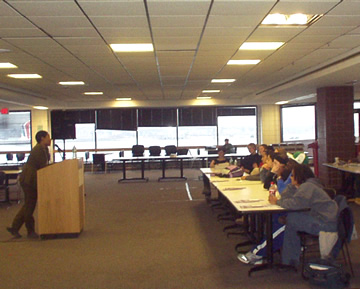Author and journalist Joan Morgan (When Chickenheads Come Home to Roost: My Life as a Hip-Hop Feminist) spoke to a appreciative crowd at a “Beginning of the Semester Party” last Tuesday afternoon. Her speech was punctuated by frequent bursts of applause and encouragement Morgan read from her new book and spoke at length about her life as a hip-hop journalist and her roots in the South Bronx, NY. The event was sponsored by a diverse collection of departments and student groups, including the Women’s Center, the Queer Student Union, the Black Student Center, and the Student Senate.
Morgan spoke movingly and with a fond remembrance of her early days hanging out on the gritty street corners of New York City during the earliest days of hip-hop history, listening to Kid Flash/Grandmaster Flash and soaking up the community and the energy of the new street sound coming from black America. Starting off as a freelance writer for the Village Voice, she wrote on such seminal urban events such as the Central Park Jogger and became an influential critic and writer on the “hip-hop generation.” She related how she had to prove herself to men who were, and remain, suspicious of women, especially black women, and detailed her growing awareness of hip-hop as the major new force in America in the 70’s and 80’s, and how during that time she would try to come to terms with her growing awareness of racism and sexism within and without the hip-hop culture.
Morgan read extensively from her book, When Chickenheads Come Home to Roost. A ‘chickenhead’ is a female devotee of hip-hop culture that aggressively uses her sex appeal to get ahead, to the exclusion of cultivating her talents or intelligence. Indeed, they actively degrade their brains in favor of their booty. Morgan outlined what she feels are the biggest conflicts facing feminism as a whole, black feminism and feminism seen through the prism of hip-hop. Her own stance on feminism takes into account both the great strides made in women’s rights and black rights and the increasingly rarified and abstract demands of “academic feminism.” “We’re not facing that,” remarked Morgan, “We live in the world of affirmative action; we are not facing the same issues.”
We also, as Morgan pointed out, live in a world where rap music and the hip-hop culture have seen a huge growth driven by violent and misogynistic lyrics, and, as a result, “we [went] from fly girls to bitches and hos in our brothers’ eyes.” She indicted the commercialism and individualism of modern rap music as “losing touch” with the community that fostered it, and had some harsh words for many popular idols. “I’m sorry, but Latifah’s career is going to be a little bit longer than Kim’s, you know?”
Morgan demonstrated her generosity in the question and answer period after her reading, staying an extra half-hour to engage in a spirited dialogue with the audience, answering questions that ranged from, “What’s in your stereo?”(“‘Criminal Minded,’ best album ever”) to “How do you quiet the mind when writing?” (“Ironing, cooking, ‘All My Children'”). Morgan used the non-stop questions to flesh out her views on feminism and black culture, urging the audience to get involved by complaining to BET about sexism and to boycott labels and artists that were too “bling-bling” or misogynistic. In response the question on whether sell-out female artists hurt the cause of black womanhood, Morgan replied, “Yes. Absolutely. Those people who are like, ‘I gotta get me any way I can’ are hurting everyone.” When asked for an explanation of why so many rap stars have such negative views of women, she answered, “[I] get two stories when I sit down with these guys. One is, that is what the public wants, and two, they resent the attention from women now. They aren’t that cute, these guys, and they never had any women until they were famous, and then they have women lined up outside to do whatever for however much.”
Morgan fielded even the most controversial issues with aplomb; when asked whether white culture had sent in the “infiltrators” to steal hip-hop from the blacks, she responded, “No, I don’t think so, there’s just too much and we’ve come too far. And, well, Eminem…now the trailer park has a voice.” She ended her talk by urging feminists and people in general to “be more honest about how they are wedded to gender roles,” saying that women think they need to deny their needs to fit into the ‘role’ of a feminist. The audience responded with a standing ovation.
The party itself was a success, serving up big plates of soul food, distinguished to this reporter’s palate by collard greens that were actually cooked up right and served up in their pot and liquor, a mighty rarity in these parts. DJ Brynnmore spun conscious reggae and a very nuanced set of old school, on a sound system that was probably designed originally for loosening geological formations. Many students were observed to be dancing and smiling and laughing amiably. Ginn Norris, coordinator of the Women’s Center, explained, speaking over the unusual amounts of beat in Wheatley Cafeteria, that Joan Morgan had been approached after Ms. Norris read Chickenheads over the break and found that many other faculty and students Morgan.
“She was absolutely great,” said Norris, “and we wanted hip-hop, and she happened to stick out.” Asked how the party had been planned and where the original idea had come from, Norris explained, “Well, last semester, we did a survey… and people want food and hip-hop. That’s about it.” She added with a wise smile, “And we’re going to throw some politics at them.”





















































